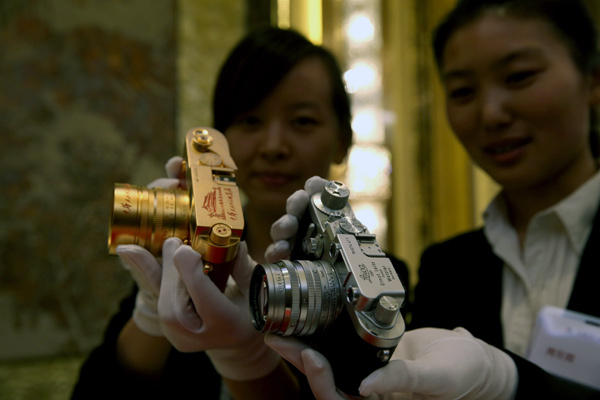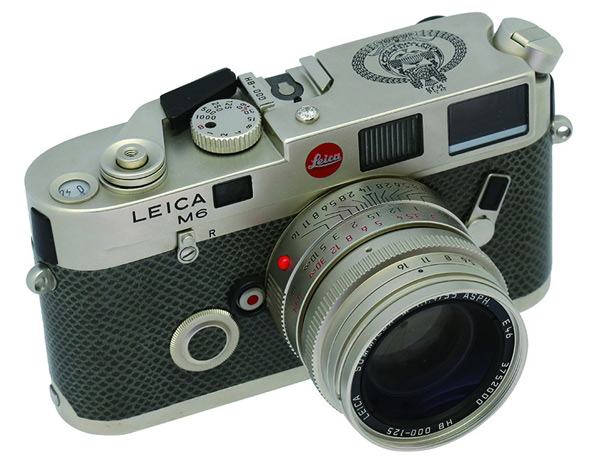Chinese join the wave of Leica collectors
By Deng Zhangyu (China Daily) Updated: 2013-07-18 05:46
|
 Two vintage Leica cameras are displayed at an exhibition held by L&H Auction in Beijing. [Photo / China Daily]
|
Since its birth 100 years ago, German camera Leica has been wooed by collectors and fans from Europe, the US and Japan. Chinese collectors have recently jumped on the bandwagon, with their favorite being vintage Leica to make up for the missing years.
In June, Hong Kong-based L&H Auction held a photographic auction for the growing collection market from the Chinese mainland. A custom-made M6 camera for the Brunei sultan's 50th birthday was sold at a hammer price with commission of HK$4.47 million ($576,231) to a collector from the mainland.
|
 The custommade M6 camera for the sultan of Brunei’s 50th birthday is an important exhibit of the show. [Photo / Provided to China Daily]
|
"In the past seven years, the number of Chinese Leica buyers has been spiraling upwards. Many of the record hammer prices are offered by buyers from the Chinese mainland," says Henry Chau, president of L&H Auction.
Online photographic auction websites used to have only English and Japanese languages. Many have added the Chinese language.
It cannot be denied that Leica collectors are mainly from the US and Europe because of their long history, but Chinese collectors are catching up.
Chau has been a fan and collector of Leica since he was young. For him, a vintage Leica is more than a camera. It's a sophisticated artwork and yet still has the ability of taking good quality photos.
"When I click the shutter, the sound is crisp. I love it," says Chau. He uses his Leica cameras every day, to have a fuller enjoyment from his collection.
Like in collecting paintings and antiques, Hong Kong and Taiwan are well ahead of the Chinese mainland in vintage Leica collection.
Chau says collectors in Hong Kong are planning to build a Leica museum. And in Taiwan, Barry Lam, who is the biggest collector of Chinese painter Zhang Daqian's works, has the most Leica cameras.
Photographer Tian Zhili from Beijing also loves the crisp clicks of vintage Leicas. Tian calls himself a "big fan" rather than a collector, boasting a selection of about 40 Leica cameras and accessories.
"Camera is a man's big toy. But Germany has made its camera into an industrial revolution classic. That's what we lack. We haven't experienced the industrial revolution. We admire the classic and the spirit of that period," says Tian.
The first Leica collectors in China started their connection with the luxury camera in the 1970s. Most were photographers with the military or State-owned newspapers.
In the 1980s, Tian bought his first camera - Chinese brand Seagull - with a price seven times his monthly pay, at 300 yuan. At that time, people had to go abroad to buy a Leica camera and pay over 5,000 yuan for an M6 Leica camera without a lens. That was a huge sum of money.
- China 'incredibly innovative' in many areas: Apple CEO
- City official: Guangzhou further committed to opening-up
- Jack Ma: Globalization backed by technology will cut inequality
- HNA confirms interest in ASEAN's infrastructure investment
- Comments on Xi's letter to 2017 Fortune Global Forum
- China to create more opportunities for the world: Xi
- US tax cuts impact on China two-sided: economists
- Chinese enterprises job fair to be held in Sri Lanka

















